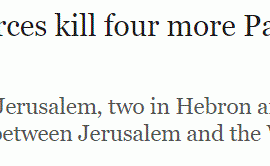1) Fatah vice-president Mahmoud al Aloul is profiled in a report by Yoni Ben Menachem at the JCPA.
“Mahmoud al-Aloul considers himself the heir to Mahmoud Abbas’ position of chairman of the Palestinian Authority. He is not in favor of dismantling the Palestinian Authority, and he sees its establishment as a national achievement. However, he supports adopting a tough stance against Israel. “The Palestinian Authority must deepen its opposition to the Israeli occupation,” he emphasized.
Meanwhile, despite al-Aloul’s rivalry with Jibril Rajoub, who was appointed secretary-general of the Fatah movement and is essentially the organization’s “number three,” both men are working together against Prime Minister Rami Hamdallah, a protégé of Mahmoud Abbas.
And both of them are working against Muhammad Dahlan, who is a shared political rival and is also claiming the crown of the Palestinian Authority.
Although Mahmoud al-Aloul is not considered as a threat to Mahmoud Abbas, he is a man with lots of experience with terrorist activities and assassinations.
According to senior Fatah officials, two years ago al-Aloul tried to assassinate Ghassan al-Shakaa, a member of the PLO executive committee and former mayor of Shechem, who died at the end of January 2018 from a malignant disease.”
2) Also at the JCPA, Pinhas Inbari explains why “The “After Abbas” Issue Intensifies Tensions among Fatah Top Brass“.
“The leaders of the Tanzim are each arming themselves and mustering within their individual areas. Jibril Rajoub is mobilizing the Hebron region, Mahmoud al-Aloul, Abbas’ official deputy, is organizing the Nablus region, and the Tanzim in Jenin have lost interest in the leadership in Ramallah and are effectively creating their own autonomy.
One of the names mentioned as a possible successor is senior security official Majid Faraj, who is responsible for security cooperation with Israel. His candidacy has aroused international support, but internally he is seen as a collaborator. While the internal balance system does not enable any decision to be made, Faraj can still get involved and stage a kind of coup. Standing against him, in all probability, will be Mohammed Dahlan and the residents of the refugee camps. Dahlan has invested a lot in the camps, and previous skirmishes between the official security forces and Dahlan’s “troops” concluded without a clear winner.”
3) A report by NGO Monitor addresses “The Exploitation of Palestinian Women’s Rights NGOs“.
The European Union (EU), United Nations (UN), and various European governments provide funding and legitimacy to a plethora of Palestinian non-governmental organizations (NGOs) dedicated specifically to women’s issues such as political, civic, and economic rights, gender-based discrimination and violence, education, support, and women’s healthcare. The number of women’s organizations has steadily risen since the 1960s (see Appendix 1), and today, there are dozens of local Palestinian NGOs meant to serve the needs of women from various sectors of society. […]
However, NGO Monitor research and analysis reveals that many of these organizations utilize their platform on women’s issues to promote politicized narratives that, in contravention to EU policy, are often rejectionist and violent, many times to the detriment of gender equality within Palestinian society. This trend can be largely attributed to a subordination of gender equality and/or female empowerment to Palestinian political agendas. This problematic phenomenon frequently leads to a disproportionate focus on Israel as the cause of gender inequality, while not paying adequate attention to internal, systemic practices within Palestinian society that are discriminatory against women. These include, but are not limited to, a biased legal system, inaccessible political hierarchy, and restrictive cultural traditions.”
4) At the Algemeiner Ben Cohen reports on a story that has not received any BBC coverage to date.
“Former Argentine President Cristina Fernández de Kirchner is facing a potential double trial, as the latest twist in the investigation of the 1994 bombing of the AMIA Jewish center in Buenos Aires left the legal immunity that she is now entitled to as a member of the Senate looking more vulnerable.
Federal Judge Claudio Bonadio ruled on Monday [March 5th] that Kirchner, ex-foreign minister Héctor Timerman, and ten other close aides will face trial over a 2013 pact with Iran that whitewashed Tehran’s responsibility for the AMIA bombing — one of the worst-ever terrorist atrocities in Latin America, in which 85 people died and hundreds more were wounded.”




